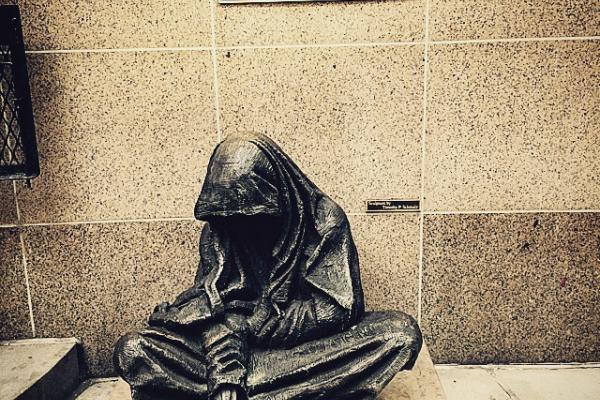“ I needed clothes and you clothed me, I was sick and you looked after me, I was in prison and you came to visit me. ” —Jesus, in Matthew 25:36
On May 31, 1973, a group of inmates at Philadelphia’s Holmesburg Prison walked into the deputy warden’s office to ask for the establishment of a special prayer room for Muslim prisoners. When Deputy Warden Robert F. Fromhold denied their request, inmates turned on him and Warden Patrick N. Curran, stabbing both men dead with shivs.
On the morning of Sept. 27, the last day of his first trip to the United States, Pope Francis visited a Philadelphia prison named for Curran and Fromhold, where he expressed solidarity with the female and male prisoners.
“I am here as a pastor, but above all as a brother, to share your situation and to make it my own,” he said, and bestowed one-on-one blessings upon a number of inmates — including several who appeared to be Muslim.
“Life is a journey, along different roads, different paths, which leave their mark on us,” Pope Francis told inmates at the Curran-Fromhold Correctional Facility, the largest and one of the most historically troubled in Philadelphia.
“We know in faith that Jesus seeks us out. He wants to heal our wounds, to soothe our feet, which hurt from travelling alone, to wash each of us clean of the dust from our journey. He doesn’t ask us where we have been, he doesn’t question us what about we have done,” the pontiff said.
“He wants us to keep walking along the paths of life, to realize that we have a mission, and that confinement is not the same thing as exclusion.”
Sunday’s visit was one of several to prisons Francis has made since his election as pontiff in March 2013. He famously visited a youth detention center in Rome on Holy Thursday 2013 where he washed the feet of several inmates, including a Muslim woman. He visited another Roman prison for this year’s Holy Thursday where he again washed the feet of several detainees , and on his papal visit to Bolivia earlier this year, made a pastoral stop at Palmasola — reportedly the most notorious of that country’s 32 prisons.
“Life means ‘getting our feet dirty’ from the dust-filled roads of life and history,” Francis told the audience in the Philadelphia prison, which included prisoners’ families, prison staff, and the families of both Curran and Fromhold.
“It is painful when we see prison systems which are not concerned to care for wounds, to soothe pain, to offer new possibilities. It is painful when we see people who think that only others need to be cleansed, purified — and do not recognize that their weariness, pain, and wounds are also the weariness, pain, and wounds of society.”
Last week in his historic address to Congress, while expounding on society’s “responsibility to protect and defend human life at every stage of its development,” the pope expressed his concern for prison reform and clear support for the global abolition of the death penalty.
“This conviction has led me, from the beginning of my ministry, to advocate at different levels for the global abolition of the death penalty,” Francis said.
“I am convinced that this way is the best, since every life is sacred, every human person is endowed with an inalienable dignity, and society can only benefit from the rehabilitation of those convicted of crimes.”
Pope Francis’ focus in both word and action on prisons and prisoners during his U.S. papal visit was a thematic lynchpin in his ongoing pastoral outreach to the marginalized, disenfranchised, and even demonized of society.
Inmates at the Philadelphia prison include some of the most violent offenders, including murderers and rapists. But Francis insisted that God’s grace covers all manner of sins for all of us.
“All of us have something we need to be cleansed of, or purified from. All of us,” the pope said, repeating the word todos (“all of us”) in Spanish as he pointed to himself.
“May the knowledge of that fact inspire us to live in solidarity, to support one another, and seek the best for others. Let us look to Jesus,” who washes our feet.
After his 15-minute speech to the Philadelphia prisoners, he thanked them for the chair they spent months crafting for him, and then greeted each of the 95 prisoners present — starting with the front row, which was filled by female inmates.
The pope shook their hands, offered blessings, and embraced several inmates who spoke to him in Spanish and in English.
Many political, religious, and world leaders speak about prison reform, but a scant few actually visit prisoners, as Jesus asks his followers to do.
Pope Francis’s words to the Philadelphia inmates were beautiful and grace-filled. But the image of him embracing an inmate in a full hug and then placing his hand on the man’s forehead, tracing the sign of the cross there with his thumb, is indelibly imprinted in my mind.
May it leave a mark on our hearts as well, for many days to come. And may we follow our brother Francis’ example in thought, word, and deed.
Got something to say about what you're reading? We value your feedback!

